Select Language
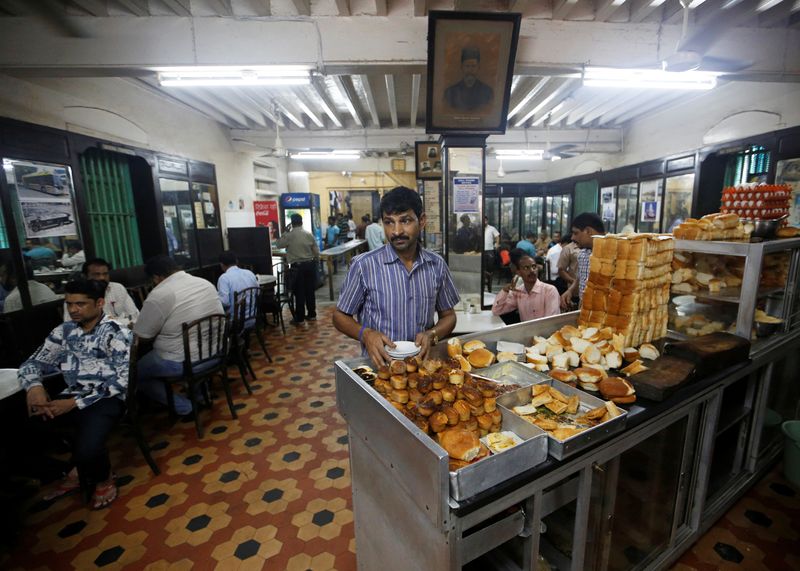
By Shaloo Shrivastava
BENGALURU (Reuters) - Growth in India's dominant services sector remained robust but slackened to a 10-month low in September as demand slowed, a business survey showed on Friday.
The HSBC final India Services purchasing managers' index, compiled by S&P Global, fell to 57.7 in September from a five-month high of 60.9 in August and was below a preliminary estimate of 58.9.
"The headline business activity index fell below 60 for the first time in 2024, but we note that at 57.7, it was still much above the long-term average," noted Pranjul Bhandari, chief India economist at HSBC.
For more than three years, the index has stayed above the 50-mark separating expansion from contraction.
The new business sub-index - a gauge for overall demand - slipped to its lowest since November but was still above its historical average. International demand rose at its slowest pace this year.
Nevertheless, the business outlook for the year ahead improved, prompting firms to continue adding headcount. Hiring picked up slightly from August, extending the streak of job creation to more than two years.
Cost inflation accelerated from August as prices of electricity, food and other materials increased. However, firms passed on extra costs to clients at the slowest pace since February 2022.
"Services companies' margins have likely been squeezed further, as prices charged rose at a slower pace when input cost inflation intensified," added Bhandari.
Indian inflation was below the Reserve Bank of India's (RBI) 4% medium-term target in July and August. It was predicted to average 4.2%-4.6 in each quarter until at least July 2026, according to a recent Reuters poll.

By Jamie McGeever
ORLANDO, Florida (Reuters) -In today's digital and services-dominated economy, one might be forgiven for buying into the narrative that oil no longer has any real bearing on inflation.
That would be a mistake.
Inflation is starting to undershoot some central banks' targets, in large part because the year-on-year change in the oil price is deeply negative. This is sending a clear message: oil still matters – a lot.
There's barely any corner of the economy that oil doesn't reach. It heats homes and businesses, powers factories and every means of transport, and is a key input in the production of chemicals, plastics, materials and all manner of goods.
True, its direct and indirect contribution to price pressure has been diluted compared to the energy-intensive economy of decades gone by, but oil is still one of the most accurate inflation weather vanes around.
And, despite recent geopolitical ructions, it's still clearly pointing in one direction.
HEAD FAKE
If investors get their oil price forecast wrong, chances are their view of inflation – and, by extension, central bank policy and the broader macro landscape - will also be blurred at best, and blinded at worst.
This is happening now. The past year featured many head fakes, misleading signals and wrong calls in financial markets, but perhaps the most consequential has been the collective miss on the direction of oil.
In a Reuters poll of economists and analysts conducted a year ago, the average 2024 price of Brent and West Texas Intermediate futures was forecast to be around $86 a barrel and $83/bbl, respectively.
Brent rose above $90/bbl in April and WTI got close to that level, but oil prices have fallen sharply since then and last month dipped below $70/bbl. The year-on-year change in WTI has been negative every day since July 22 and approached -30% as recently as last week.
The effects of this on overall inflation are huge. Annual inflation in the euro zone is now 1.8%, below the European Central Bank's 2% target for the first time in more than three years. Consequently, ECB interest rate cut expectations have intensified considerably, even though central banks are theoretically supposed to ignore energy price fluctuations.
These dynamics are also easing price pressures in the United States, where energy inflation accounts for around 7% of the consumer price index and a much higher share of the producer price index.
FED UNDERSHOOT?
Are current energy dynamics signaling that the Federal Reserve could cut rates more quickly than many expect? It's possible.
Analysts at Goldman Sachs estimate that the energy price contribution to annual U.S. CPI will increase one-tenth of a percentage point to -0.35 percentage points by April next year, pushing headline CPI as low as 1.9%, below the Fed's 2% goal.
Using the current oil price futures curve as a guide, headline CPI inflation in April could slow to 1.8%.
Energy costs impact more than just headline inflation. Even if oil prices hold steady, core inflation will still be as much as 0.15 percentage points lower by the end of next year, and will drop a further 0.15 percentage points if oil falls another $20/bbl, Goldman's analysts reckon.
On the surface, the above figures may sound like small numbers, but in central banking every basis point matters. And these shifts can still move the needle on inflation and thus accelerate the Fed's easing cycle.
Some measures of annualized monthly inflation rates are already at or below the Fed's 2% target, and Fed Governor Christopher Waller recently warned that core inflation could soon follow suit.
"Consumer energy prices are dragging down headline inflation. With oil prices down another 7% in September ... this drag should intensify in the September CPIs," JP Morgan economists wrote late last month.
Now, a geopolitical or economic shock could obviously disrupt this narrative. But, for now, it's reasonable to assume that weak oil price dynamics could send central banks back to their pre-pandemic playbooks sooner than anyone thought.
(The opinions expressed here are those of the author, a columnist for Reuters.)
(By Jamie McGeever; Editing by Kirsten Donovan)

By Mark John
(Reuters) - Rising tensions in the Middle East add new uncertainties for the global economy even as policymakers start to congratulate themselves on having steered it out of a bout of high inflation without triggering recession.
Israel, which has been fighting with Hamas in Gaza for almost a year, has sent its troops into southern Lebanon after two weeks of intense airstrikes, escalating the conflict in the Middle East.
The following sketches what we know about how this could play out on the world economy in the weeks ahead.
WHAT IMPACT, IF ANY, HAS BEEN FELT SO FAR?
Very little beyond the immediate region, with the main effects limited to financial markets as investors hedge their portfolios with safe-haven assets. The U.S. dollar has been a beneficiary since Iran's ballistic missile attack on Israel: the dollar index, which measures the U.S. currency against the euro, yen and four other top currencies, is trading around three-week peaks.
Oil prices rose around 2% on Thursday on concerns a wider conflict could disrupt crude oil flows from the region - for example if Israel chose to target Iranian oil infrastructure which in turn could trigger retaliation from Iran.
But it is not clear that this will translate into the kind of sustained, sharper rises that motorists start to notice at the fuel pump. Analysts point out that the United States has high levels of crude oil inventories while OPEC producing nations have enough spare capacity to smooth out the impact of disruptions, at least in the short term.
HOW ARE ECONOMIC POLICYMAKERS REACTING?
As always, central bankers stress that their job is to look beyond unpredictable, one-off shocks to the economy and instead focus on the deeper, underlying trends. But they cannot afford to totally ignore geopolitical events either.
Bank of England Governor Andrew Bailey told The Guardian newspaper that the bank could move more aggressively to cut interest rates if inflation pressures continue to weaken - suggesting central bankers for now did not see the Middle East conflict as a major threat to their attempts to temper inflation. Bailey said there seemed to be a commitment to keep oil markets stable but he also said the conflict could yet push up oil prices if things keep escalating.
Sweden's Riksbank Deputy Governor Per Jansson delivered a similar message, saying the effects of the Middle East conflict were not yet enough to warrant scratching economic forecasts.
The International Monetary Fund said on Thursday an escalation of the conflict in the Middle East could have significant economic ramifications for the region and the global economy, but commodity prices remain below the highs of the past year. It was too early to predict specific impacts on the global economy, IMF spokesperson Julie Kozack said.
WHEN WILL ANY IMPACT BECOME MORE EVIDENT?
For context, Brent crude futures are currently around $75 a barrel, well below their $84 level at the time of Hamas' Oct. 7 strike on Israel nearly a year ago and far off the $130 highs reached after Russia's invasion of Ukraine in February 2022.
Europe would be exposed to rising oil prices because, unlike the United States, it has no major domestic oil production. But even there, policymakers estimate a durable 10% rise in prices would be needed to push up inflation by just 0.1 percentage point.
The economic impacts of an all-out war that led to wider attacks on energy infrastructure throughout the Middle East and Gulf regions plus further disruptions to trade routes through the Red Sea, would be more tangible.
Oxford Economics estimated such a scenario would spike oil prices up to $130 and knock 0.4 percentage points off global output growth next year, which the International Monetary Fund currently sees at around 3.3%.
(This story has been corrected to change the year to 2022, not 2023, in paragraph 14)
(Writing and reporting by Mark John in London; Additional reporting by David Lawder in Washington; Editing by Susan Fenton)
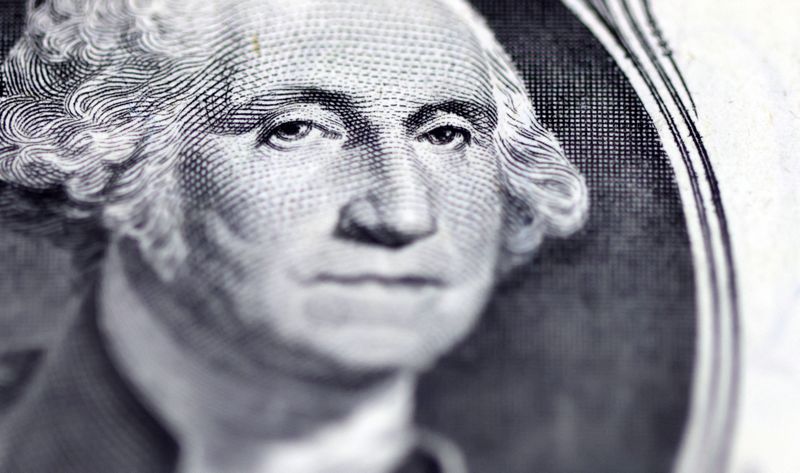
By Karen Brettell
NEW YORK (Reuters) -The dollar rose to a six-week high on Thursday as data showed a still-solid U.S. economy before Friday's closely watched jobs report, while safe haven demand on concerns about rising Middle East tensions and the impact of a dockworker strike also boosted the currency.
The greenback has additionally benefited from more dovish central bank expectations being built into currency peers, including the euro, sterling and yen.
Data on Thursday showed that U.S. services sector activity jumped to a 1-1/2-year high in September amid strong growth in new orders, though its measure of services employment fell, consistent with a slowdown in the labor market.
"Today is an example of how quickly the U.S dollar can recover," said Juan Perez, director of trading at Monex USA in Washington. While Thursday's data was "a little contractionary," the U.S. remains the envy of other countries, he said.
Other data on Thursday showed that the number of Americans filing new applications for unemployment benefits rose marginally last week, but Hurricane Helene's rampage in the U.S. Southeast and strikes at Boeing (NYSE:BA) and ports could distort the labor market picture in the near term.
The dollar index was last up 0.33% at 101.98 and reached 102.09, the highest since Aug. 19. It hit a 14-month low of 100.15 on Sept. 27.
"The dollar has been regaining some ground this week... some of it is just markets trying to navigate a lot of crosscurrents," said Vassili Serebriakov, FX & macro strategist at UBS in New York.
Improving economic data and more hawkish comments from Federal Reserve Chair Jerome Powell on Monday have reduced expectations that the Fed will cut rates by another 50 basis points at its Nov. 6-7 meeting.
Friday’s jobs report for September is the next major U.S. economic release that may sway Fed policy. Economists polled by Reuters expect 140,000 job additions, while the unemployment rate is anticipated to stay steady at 4.2%.
"U.S. data has been a bit firmer, which probably makes the market a little bit more cautious about selling the dollar ahead of the nonfarm payrolls report," Serebriakov said.
Traders are now pricing in a 35% probability of a 50 basis point cut next month, down from 49% a week ago, the CME Group's (NASDAQ:CME) FedWatch Tool shows.
The U.S. currency has benefited from a safety bid since Israel was attacked by Iran on Monday in a strike that raised fears the oil-producing Middle East could be engulfed in a wider conflict.
Oil prices rose on Thursday on concerns that crude oil flows from the region could be disrupted. Asked on Thursday if he would support Israel striking Iran's oil facilities, U.S. President Joe Biden told reporters: "We're discussing that."
Long lines of container ships also appeared outside major U.S. ports on Thursday as the biggest dockworker strike in nearly half a century entered its third day, preventing unloading and threatening shortages of everything from bananas to auto parts.
"The U.S. dollar is a safe haven in the midst of chaos," said Perez. "In the post-pandemic world the number one concern was, can we rebuild healthy supply chain logistics? And this headline news completely destroys that stability and health."
The euro has fallen on increasing expectations that the European Central Bank will cut rates at its Oct. 17 meeting as inflation recedes.
It fell 0.17% to $1.1026 and got as low as $1.1008, the lowest since Sept. 12.
Sterling tumbled after Bank of England Governor Andrew Bailey said that the British central bank could move more aggressively to cut interest rates if inflation pressures continue to weaken.
The British pound was last down 1.15% at $1.3114 and reached $1.3093, the lowest since Sept. 12.
The dollar also hit a six-week high against the yen as Bank of Japan board member Asahi Noguchi said the Japanese central bank must move cautiously and slowly to avoid hurting the economy.
It comes after Prime Minister Shigeru Ishiba said on Wednesday that Japan is not in an environment for an additional rate increase.
The dollar was last up 0.27% at 146.85 and earlier reached 147.25, the highest since Aug. 20.
In cryptocurrencies, bitcoin fell 0.36% to $60,687.91.

LONDON (Reuters) - Major brokerages, including Goldman Sachs and JPMorgan, now expect the European Central Bank to deliver a quarter-point cut at its Oct. 17 meeting, on the back of recent data showing economic weakness and slowing inflation.
Market pricing now reflects around a 90% chance of such a rate cut, which would follow reductions at the ECB's June and September meetings, as the data pushes policy makers to focus more on growth and less on price pressures.
Euro zone inflation dipped below 2% for the first time since mid-2021 in September, according to Tuesday data, while last week surveys showed euro zone business activity contracted sharply and unexpectedly in September, as the bloc's dominant services industry flatlined and a downturn in manufacturing accelerated.
Sources told Reuters that ECB policy doves are preparing to fight for an October rate cut - though this would likely meet resistance from more conservative peers - a turnaround from the aftermath of the ECB's September meeting when they saw an October move as unlikely.
Here are the latest forecasts from some brokerages.
Brokerage Oct '24 rate Dec '24 Terminal rate/end
cut estimate estimate '25 forecast
(bps) (bps)
Goldman 25 25 2.0% (June 2025)
Sachs
HSBC 25 25 2.25% (April 2025)
BNP Paribas (OTC:BNPQY) 25 25 2.25% (end-2025
forecast)
RBC 25 25 2.25% (April 2025)
JPMorgan 25 25 2.0% (June 2025)
Barclays 25 25 2.0% (June 2025)
25 25 2.5%
TD (March 2025)
Securities
25 25 Close
Jefferies to 2.0% (end 2025)
25 2.0%-2.5%
Deutsche 25 (mid-2025)
Bank
2.5%
Commerzbank (ETR:CBKG) 25 25 (June 2025)
1.5%
Bank of 25 25 (end-2025)
America
1.75%
Nomura 25 25 (Sept 2025)
2.0%
SEB 25 25 (June 2025)
1.5%
Citi 25 25 (Sept 2025
UBS IB - 25 2.25% (end-2025
forecast)
ING - 25 2.25% (end 2025
forecast)
BBVA (BME:BBVA) - 25 2.75% (November
2025)
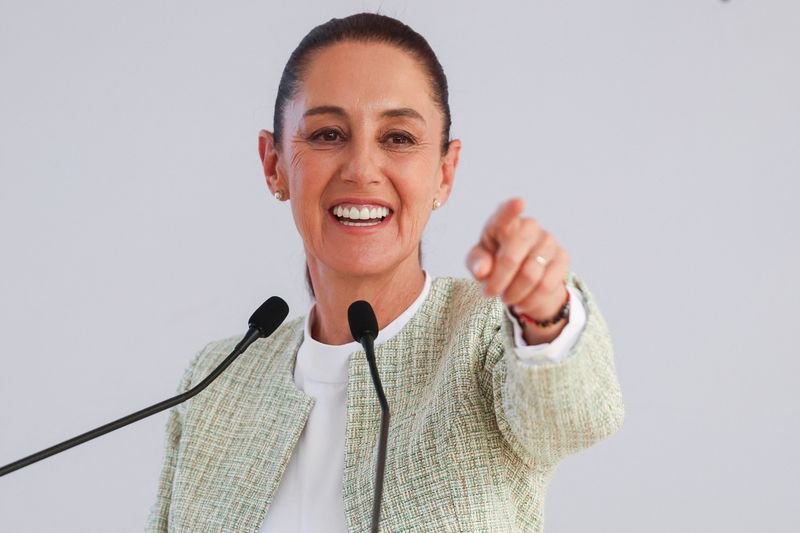
By Diego Oré and Cassandra Garrison
MEXICO CITY (Reuters) - Claudia Sheinbaum was sworn in as Mexico's first woman president on Tuesday, vowing to bolster women's rights and ensure Latin America's No. 2 economy remains a secure destination for international investment.
Sheinbaum, a 62-year-old scientist and former mayor of Mexico City, took the oath of office and received the presidential sash in a boisterous ceremony in Mexico's Congress, which marks the start of her six-year term.
"It's time for transformation, it's time for women," she said, her voice rising with emotion.
"I'm a mother, a grandmother, a scientist and a woman of faith, and from today, by the will of the Mexican people, the president," she said.
Sheinbaum also used her first speech as head of state to address investor concerns after the passing of a sweeping judicial reform pushed by her predecessor, Andres Manuel Lopez Obrador.
She reiterated that the central bank would be autonomous and told investors: "Rest assured that the investments of national and foreign shareholders will be safe in our country."
Alberto Ramos, head of Goldman Sachs Latin American economic research, said Sheinbaum will be judged on whether she can construct "a predictable and investment-friendly policy and regulatory framework."
"Disciplined management of the budget and of state-owned enterprises, progress on public security, and safe-guarding the integrity of key institutions will be key to preserving market sentiment and sovereign debt ratings," Ramos said, emphasizing the importance of heavily-indebted state oil company Pemex.
Sheinbaum pledged that the Mexican oil giant will look to maintain daily oil production at 1.8 million barrels, in line with current output.
The November presidential elections in the United States, Mexico's largest trading partner, could add to market volatility, especially if former President Donald Trump, who has vowed to increase tariffs on Mexican goods, wins.
Sheinbaum's government will present its first budget before Nov. 15, which is expected to be highly scrutinized for clues on whether she will make good on commitments to reduce the fiscal deficit to 3.5% of gross domestic product from 5.9%, where it is predicted to close the year.
In an afternoon speech in the capital's historic Zocalo square, she offered 100 pledges, ranging from expanding public healthcare and education to building 1 million new homes, capping prices for key goods and sending Congress a package of reforms to battle gender violence and discrimination.
Sheinbaum said she will unveil the package on Thursday, and said it will include proposed changes to the constitution and seek to reduce impunity and protect women in a nation that records some of the world's highest femicide rates.
"Our guide is the happiness and wellbeing of the people," she said. "I pledge to you to keep making history."
CONTINUITY WITH CHANGE?
Lopez Obrador, whose six-year term began in late 2018, managed to double Mexico's minimum wage, reduce poverty and unemployment, broaden the base of social programs and oversee a previous strengthening of the peso. Touting these successes boosted his popularity and helped usher Sheinbaum, his protégée, to a landslide victory in the June elections.
Mexican presidents are limited to serving a single six-year term.
Sheinbaum, however, who has promised "continuity with change," will inherit the largest budget deficit since the 1980s and lagging economic growth.
Experts say Mexico's economy will require a tax reform to increase revenues, though Sheinbaum has for now ruled out a sweeping tax overhaul.
Instead, she has said she will pursue other options, including improving the efficiency of tax collection at customs.
Sheinbaum "will have to deliver an important fiscal consolidation if she wants to keep the positive view that markets have today towards her," said Bernardo Keiserman, an economist at investment bank Bradesco BBI.
"We believe the government is committed to an adjustment, but delivering one sizable enough is not going to be an easy feat. The economy is weaker and likely weakening further," said Keiserman.
Recently, the central bank cut its GDP growth forecast for this year to 1.5% from the previous 2.4% and lowered its estimate for 2025 to 1.2%.
Nearshoring, the trend of companies moving production closer to their main market, has helped Mexico attract investment, but Sheinbaum will face a challenge to increase foreign investment while implementing the judicial reform.
The judicial reform, under which judges will be elected by popular vote, has scared investors and drawn criticism from the U.S. ambassador to Mexico, who said it threatened the rule of law.
"I'll govern for everyone and be assured that I'll put my knowledge, strength, my history, and my life itself at the service of the people and the country," said Sheinbaum.
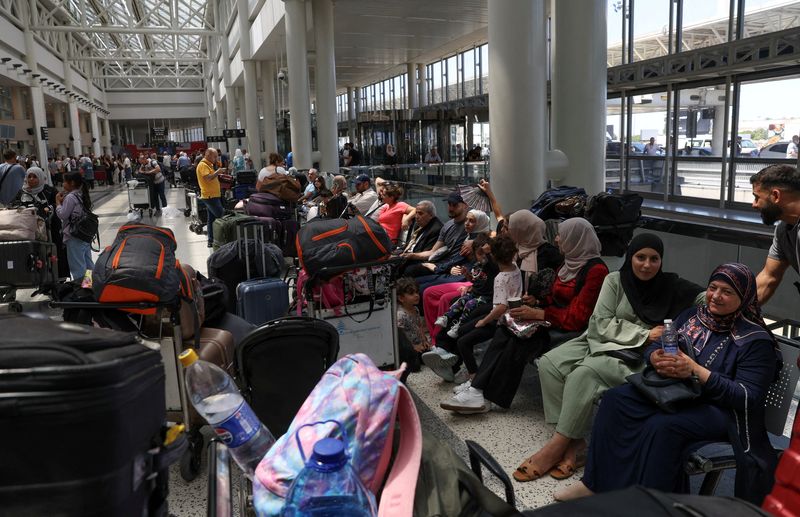
PARIS (Reuters) - Israel's neighbours closed airspace and airline crews skirted an escalating conflict, with many seeking diversions, after Iran fired a salvo of ballistic missiles at Israel on Tuesday.
A spokesperson for tracking service FlightRadar24 said flights diverted "anywhere they could," and a snapshot of traffic in the region showed flights spreading in wide arcs to the north and south, with many converging on Cairo and Istanbul.
FlightRadar24 said Istanbul and Antalya in southern Turkey were becoming congested, forcing some airlines to divert south.
Iran launched the strikes in retaliation for Israel's campaign against Tehran's Hezbollah allies in Lebanon, and Israel vowed a "painful response" against its enemy.
Eurocontrol, a pan-European air traffic control agency, earlier sent a warning to pilots about the escalating conflict.
"A major missile attack has been launched against Israel in the last few minutes. At present the entire country is under a missile warning," it said in an urgent navigation bulletin.
Shortly afterwards it announced the closure of Jordanian and Iraqi airspace as well as the closure of a key crossing point into airspace controlled by Cyprus.
An Iraqi pilot bulletin said its Baghdad-controlled airspace was "closed due to security until further notice".
Iraq's transport ministry later announced the reopening of Iraqi airspace to incoming and outgoing civilian flights at Iraqi airports. FlightRadar24 said on X that "it will be a while before flights are active there again".
Jordan also reopened its airspace after closing it following the volley of Iranian missiles fired towards Israel, the Jordanian state news agency reported.
Lebanon's airspace will be closed to air traffic for a two-hour period on Tuesday, Transport Minister Ali Hamie said on X.
The latest disruptions are expected to deal a further blow to an industry already facing a host of restrictions due to conflicts between Israel and Hamas, and Russia and Ukraine.
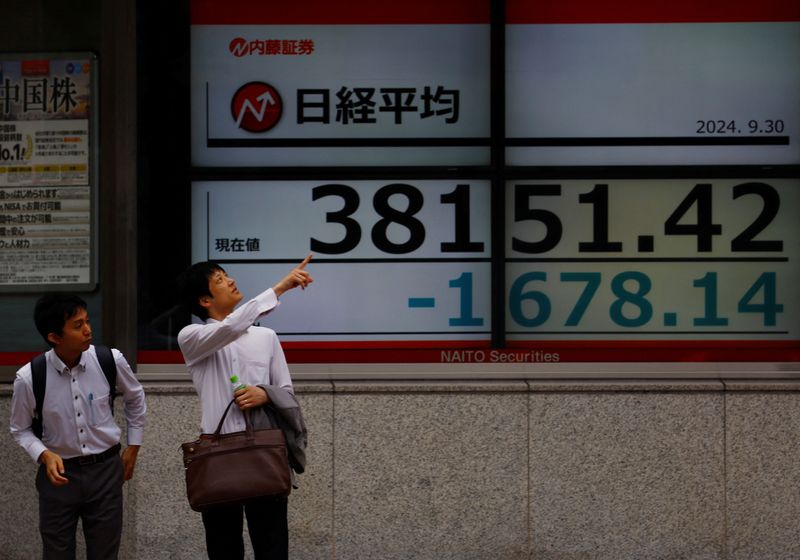
By Kevin Buckland
TOKYO (Reuters) - Asia stocks sank on Wednesday, catching up with the sell-off on Wall Street after Iran's ballistic missile strike on Israel provoked fears of a wider regional conflict, while crude oil pushed higher on the risk of supply disruptions.
Investors flocked to safer assets, pushing U.S. Treasury bond yields down in Asian time, while gold hovered near an all-time high.
The safe-haven dollar traded close to its strongest in three weeks versus the euro. Macroeconomics also buoyed the dollar, with a resilient U.S. job market arguing for a smaller Federal Reserve interest-rate cut in November, and euro zone inflation trends backing a European Central Bank easing this month.
Japan's Nikkei slumped 1.5% as of 0022 GMT, while South Korea's KOSPI dropped 1.3% and Australia's benchmark lost 0.3%.
MSCI's broadest index of Asia-Pacific shares slipped about 0.5%.
Hong Kong's Hang Seng had yet to open after a holiday on Tuesday. Mainland Chinese markets are shut for the week-long Golden Week holiday. Trading in Taiwan was suspended due to a typhoon.
U.S. S&P 500 stock index futures weakened 0.16%, after the cash index lost 0.9% overnight.
"In the chain of potential market volatility shocks, geopolitics will typically trump economics, corporate earnings, or a central bank response - largely because most market players are poor at pricing risk around these events," said Chris Weston, head of research at Pepperstone.
"While these events typically reconcile in a market positive fashion, the tail risk it can throw up is clearly significant," Weston said. "The situation remains fluid, and the slightest calming or increased aggression in the rhetoric from Israel or Iran could result in a sizeable impact on sentiment in markets."+
Iran said early on Wednesday that its missile attack on Israel was finished barring further provocation, although Israel and the U.S. promised retaliation.
Brent crude futures gained more than 1% to $74.33 per barrel, extending the 2.5% advance from Tuesday. U.S. WTI futures gained 1.3% to $70.73 per barrel, after Tuesday's 2.4% rally.
Gold eased 0.16% to $2,658.63 per ounce, following a more than 1% jump in the previous session that brought it close to last month's record high at $2,685.42.
Benchmark 10-year Treasury yields ticked down 1.5 basis points (bps) to 3.7278%.
The dollar index, which tracks the U.S. currency versus the euro and five other major rivals, was steady at 101.21 after pushing as high as 101.39 on Tuesday for the first time since Sept. 19.
Europe's shared currency was little changed at $1.1070 following a 0.6% drop in the previous session, when it dipped to $1.1046 for the first time since Sept. 12.
Euro area data on Tuesday showed inflation fell below the ECB's 2% target last month, bolstering bets for a quarter-point rate cut on Oct. 17.
Meanwhile, U.S. figures overnight showed a solid economy, a day after Fed Chair Jerome Powell pushed back against the likelihood of another 50 basis point rate cut when the U.S. central bank meets next month.
Job openings unexpectedly increased in August after two straight monthly decreases, but hiring was soft and consistent with a slowing labour market.
Private payrolls data is due later on Wednesday, ahead of potentially crucial monthly non-farm payrolls numbers on Friday.
U.S. politics will also be in focus, as Democrat Tim Walz and Republican JD (NASDAQ:JD) Vance go head to head in a vice-presidential debate on Wednesday.

LONDON (Reuters) - Pay settlements awarded by British employers held at their lowest in two years in the three months to August, according to a survey that could reassure the Bank of England as it considers whether to cut interest rates again.
Incomes Data Research said on Wednesday that the median pay settlement awarded by major employers held at 4.0% for the second month in a row.
Median pay awards in the public sector stood at 4.5%, above those in the private sector which slowed to 4.1%.
"The differing outcomes in the private and public sectors reflect the cycle of pay between the two, with the public sector currently in the 'catching-up' phase, after a lengthy period in which pay awards lagged behind those in the private sector," Zoe Woolacott, senior researcher at IDR, said.
Finance minister Rachel Reeves announced above-inflation pay increases worth 9.4 billion pounds ($12.53 billion) for public sector workers including teachers and doctors shortly after the Labour Party won a parliamentary election in July.
Official figures last month showed British private sector wage growth cooled to a more than two-year low of 4.9% in the three months to July.
The BoE is monitoring wage growth, and expects private-sector pay to slow to 3% in late 2025.
The central bank, which cut its key Bank Rate in August for the first time since 2020 but kept it at 5% on Sept. 19, is expected to lower borrowing costs by a further quarter point at its November meeting.
The IDR analysis was based on 39 pay deals which covered more than 740,000 workers between June 1 and Aug. 31.
($1 = 0.7505 pounds)
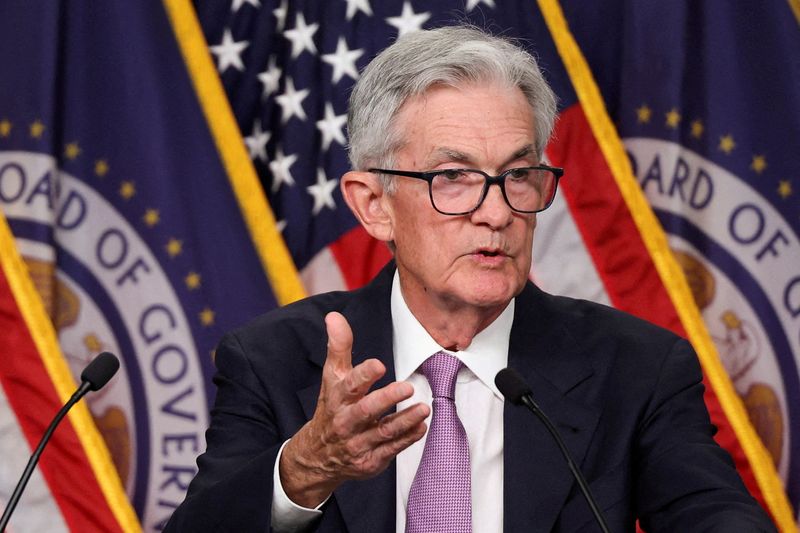
By Howard Schneider
NASHVILLE, Tennessee (Reuters) - A mistake by the U.S. central bank in setting interest rates during the last phase of its inflation battle is the main risk that could undercut the economy over the next year, according to a new survey of economists released as Federal Reserve Chair Jerome Powell was set to speak on Monday.
Among 32 professional forecasters surveyed recently by the National Association for Business Economics, 39% cited a "monetary policy mistake" as the "greatest downside risk to the U.S. economy over the next 12 months." By contrast, 23% regarded the outcome of the Nov. 5 U.S. presidential election as the biggest downside risk and the same number cited an intensification of the conflicts in Ukraine and the Middle East.
The responses in the survey, which was released on Sunday, show the intense focus on the Fed as it eases monetary policy while hoping to both keep inflation on a steady decline back to its 2% target and avoid a significant additional rise in an unemployment rate that has been increasing modestly for a year.
Powell is scheduled to address the association at 12:55 p.m. CDT (1755 GMT) in Nashville, Tennessee, and is expected to elaborate on the Fed's decision to cut its benchmark interest rate by half a percentage point at its Sept. 17-18 meeting and on the considerations that will frame an expected series of reductions in borrowing costs over the rest of this year and in 2025.
The Fed is expected to cut rates again, either by a quarter or half of a percentage point, at its Nov. 6-7 policy meeting.
Overall risks to the economy are increasing, the association's panel of economists indicated, with 55% saying it was more likely the economy would perform worse than expected than do better - with Fed policy topping the list of possible speed bumps.
As it stands, the panel at the median said U.S. economic growth is expected to slow to 1.8% next year, from an estimated 2.6% this year, with the unemployment rate rising to 4.4%, from the current 4.2%, and inflation ending next year at 2.1%.
Two-thirds of respondents said they did not expect a recession until at least 2026.
'JUST IN TIME'
Such results would likely be cheered by Powell and the Fed as a textbook "soft landing." Inflation, as measured by the central bank's preferred personal consumption expenditures price index, has fallen from a peak above 7% in 2022 to 2.2% last month without a recession or a sharp rise in the unemployment rate. While the jobless rate has risen to 4.2% from half-century lows last year of 3.4%, it remains well below the average of 5.7% recorded in Bureau of Labor Statistics data since the late 1940s.
But there's broad disagreement about how to finish the job, highlighting concerns about the Fed's ability to avoid either keeping borrowing costs and financial conditions too tight, and slowing the economy unnecessarily, or loosening so quickly that inflation rebounds.
While the median of the panel's forecasters said the current policy rate is where it should be following the Fed's recent rate cut, opinion was roughly split on that issue - with a majority feeling the central bank is already off track.
The rate move came "just in time," 65% of the respondents said.
But only one-third of them believe the current policy rate is "just right," while another third "believe the rate should be less than 4.75% and 30% believe it should be 5% or higher," the survey showed.
Among other risks cited, respondents were divided over what election outcome posed the greater threat to the economy.
Having control of Congress and the White House in the hands of one party can make decision-making smoother on issues like lifting the debt ceiling or setting a budget, but can also give a president more leeway to act on campaign promises, such as tax cuts or trade policies.
As a negative risk, 13% said a Republican sweep of the White House and Congress would pose a threat, compared to 10% who felt that way about a Democratic sweep of the executive and legislative branches of government.
By contrast, 7% of respondents viewed a Democratic or Republican sweep in a positive light.
Divided government was seen as a downside risk by 17% of respondents and an upside risk by 13%.

